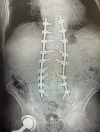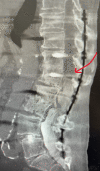Navigating the Diagnostic Challenge of Aspergillus Spinal Epidural Abscess in an Immunocompetent Patient: A Case Report and Literature Review
- PMID: 37663990
- PMCID: PMC10469057
- DOI: 10.7759/cureus.42770
Navigating the Diagnostic Challenge of Aspergillus Spinal Epidural Abscess in an Immunocompetent Patient: A Case Report and Literature Review
Abstract
Aspergillus spinal epidural abscess (ASEA) is a rare, life-threatening condition that can cause spinal cord compression with neurologic deficits. The diagnosis of ASEA can be challenging due to the atypical clinical presentation and low prevalence. We describe the successful management of a rare, immunocompetent, 85-year-old male with ASEA at the T12-L1 and L1-L2 levels and present a review of the literature. Based on most case reports and our knowledge, this is a rare presentation of ASEA in a patient without systemic symptoms, leukocytosis, or a history of immunosuppressive status due to chronic steroid use. The patient presented with multiple falls and lower extremity paraparesis with near-complete paralysis of the right lower extremity for a duration of three months. Systemic symptoms of infection were absent and standard lab evaluations were unremarkable. CT imaging identified cord signal changes at the level of T10-T11 and a contrast block at L1 suspicious for spinal stenosis and impingement. During lumbar spine exploration, purulent fluid consistent with an abscess was found in the epidural space. Cultures were forwarded to microbiology and returned with Aspergillus. Postoperatively, Infectious Disease (ID) recommended treatment with voriconazole, cefepime, and vancomycin, which yielded gradual symptom improvement. The successful management of ASEA requires a multidisciplinary approach involving neurosurgeons, infectious disease specialists, radiologists, and physical therapists. Clinicians should be aware of the possibility of ASEA regardless of systemic symptoms, and early diagnosis and prompt treatment with surgical decompression and appropriate antifungal therapy are imperative for successful management.
Keywords: aspergillus abscess; aspergillus spinal epidural abscess; infectious disease; neurosurgery; spinal abscess.
Copyright © 2023, Karmilkar et al.
Conflict of interest statement
The authors have declared that no competing interests exist.
Figures
Similar articles
-
Aspergillus spinal epidural abscess: A case report and review of the literature.J Craniovertebr Junction Spine. 2022 Apr-Jun;13(2):204-211. doi: 10.4103/jcvjs.jcvjs_35_22. Epub 2022 Jun 13. J Craniovertebr Junction Spine. 2022. PMID: 35837429 Free PMC article.
-
Spinal Epidural Abscess.J Educ Teach Emerg Med. 2020 Jan 15;5(1):S26-S52. doi: 10.21980/J8T938. eCollection 2020 Jan. J Educ Teach Emerg Med. 2020. PMID: 37465609 Free PMC article.
-
Aspergillus terreus spondylodiscitis following an abdominal stab wound: a case report.J Med Case Rep. 2019 Jun 5;13(1):172. doi: 10.1186/s13256-019-2109-5. J Med Case Rep. 2019. PMID: 31164170 Free PMC article.
-
Spinal Epidural Abscess in Children: Case Report and Review of the Literature.World Neurosurg. 2019 Jun;126:453-460. doi: 10.1016/j.wneu.2019.01.294. Epub 2019 Feb 22. World Neurosurg. 2019. PMID: 30797918 Review.
-
Vertebral osteomyelitis and epidural abscess due to Aspergillus nidulans resulting in spinal cord compression: case report and literature review.J Int Med Res. 2013 Apr;41(2):502-10. doi: 10.1177/0300060513476432. Epub 2013 Feb 11. J Int Med Res. 2013. PMID: 23569017 Review.
References
-
- Ameer MA, Knorr TL, Munakomi S, Mesfin FB. Treasure Island (FL): StatPearls [Internet]; 2023. Spinal Epidural Abscess. - PubMed
-
- Thoracic intradural Aspergillus abscess formation following epidural steroid injection. Saigal G, Donovan Post MJ, Kozic D. https://pubmed.ncbi.nlm.nih.gov/15090360/ AJNR Am J Neuroradiol. 2004;25:642–644. - PMC - PubMed
-
- Aspergillus vertebral osteomyelitis and epidural abscess. Tew CW, Han FC, Jureen R, Tey BH. https://pubmed.ncbi.nlm.nih.gov/19421672/ Singapore Med J. 2009;50:0–4. - PubMed
-
- A rare etiology of cauda equina syndrome. Batra S, Arora S, Meshram H, Khanna G, Grover SB, Sharma VK. J Infect Dev Ctries. 2011;5:79–82. - PubMed
Publication types
LinkOut - more resources
Full Text Sources
Research Materials
Miscellaneous


